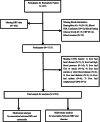Increased blood alpha-carotene, all-trans-Beta-carotene and lycopene levels are associated with beneficial changes in heart rate variability: a CVD-stratified analysis in an adult population-based study
- PMID: 33971890
- PMCID: PMC8111755
- DOI: 10.1186/s12937-021-00700-w
Increased blood alpha-carotene, all-trans-Beta-carotene and lycopene levels are associated with beneficial changes in heart rate variability: a CVD-stratified analysis in an adult population-based study
Abstract
Background: Although the associations of antioxidant micronutrients, such as carotenoids and vitamins, with cardiovascular diseases (CVDs) have been studied extensively, blood concentrations of antioxidant micronutrients and heart rate variability (HRV), which has been proven to be an indicator of cardiac autonomic control, has not been reported. We aimed to explore whether blood concentrations of antioxidant micronutrients, including carotenoids and vitamins, are associated with elevated heart rate variability (HRV (beneficial change) in a cross-sectional analysis.
Methods: Data were obtained from the Midlife in the United States (MIDUS) study that includes a general adult population. A total of 1074 (aged 34-84) individuals were included. Multivariable analyses were performed to investigate the association between main blood carotenoids (total lutein, zeaxanthin, beta-cryptoxanthin, 13-cis-beta-carotene, alpha-carotene, all-trans-beta-carotene and total lycopene) and vitamins A (retinol) and E (gamma-tocopherol and alpha-tocopherol) and HRV after adjustments were made for lifestyle factors and age-related confounders.
Results: Pearson correlation analyses showed that the increased levels of carotenoids and vitamins were positively correlated with higher HRV (all P < 0.05). After adjustments were made for age, gender, race, body mass index(BMI), ever-smoker, number of drinking years and exercise, blood alpha-carotene, all-trans-beta-carotene and total lycopene levels were independently associated with higher HRV in the linear regression model (all P < 0.05). Sensitivity analysis by adding "ever chronic respiratory diseases" as a covariate suggested that blood concentrations of these three carotenoids were still associated with higher low-frequency (LF)-HRV and high-frequency (HF)-HRV (all P < 0.05). Furthermore, stratified analyses suggested that the associations were affected by adding "heart disease" and "hypertension" as covariates.
Conclusions: We provide the first evidence that elevated blood concentrations of alpha-carotene, trans-beta-carotene and lycopene are associated with beneficial changes in HRV in the general population. Daily intake of fruit and vegetables may be beneficial to increase blood carotenoid status and further prevent autonomic dysfunction.
Keywords: Cardiovascular diseases; Carotenoid; Cross-sectional study; Heart rate variability; Vitamins.
Conflict of interest statement
The authors declared that there are no conflicts of interest.
Figures
Similar articles
-
Plasma Carotenoids, Tocopherols, and Retinol in the Age-Stratified (35-74 Years) General Population: A Cross-Sectional Study in Six European Countries.Nutrients. 2016 Sep 30;8(10):614. doi: 10.3390/nu8100614. Nutrients. 2016. PMID: 27706032 Free PMC article.
-
Exploratory 5-year follow-up study of retinol, tocopherols, and carotenoids in multiple sclerosis.Mult Scler Relat Disord. 2024 Jan;81:105143. doi: 10.1016/j.msard.2023.105143. Epub 2023 Nov 25. Mult Scler Relat Disord. 2024. PMID: 38039941
-
Associations of serum carotenoids with all-cause and cardiovascular mortality in adults with MAFLD.Nutr Metab Cardiovasc Dis. 2024 Oct;34(10):2315-2324. doi: 10.1016/j.numecd.2024.06.001. Epub 2024 Jun 6. Nutr Metab Cardiovasc Dis. 2024. PMID: 39003130
-
Plasma fat-soluble vitamin and carotenoid concentrations after plant sterol and plant stanol consumption: a meta-analysis of randomized controlled trials.Eur J Nutr. 2017 Apr;56(3):909-923. doi: 10.1007/s00394-016-1289-7. Epub 2016 Sep 3. Eur J Nutr. 2017. PMID: 27591863 Free PMC article. Review.
-
Carotenoids and cardiovascular health.Am J Clin Nutr. 2006 Jun;83(6):1265-71. doi: 10.1093/ajcn/83.6.1265. Am J Clin Nutr. 2006. PMID: 16762935 Review.
Cited by
-
Does dietary intake of vitamin A and beta-carotene increase the risk of hypertension?Cardiovasc Endocrinol Metab. 2024 Nov 14;13(4):e00316. doi: 10.1097/XCE.0000000000000316. eCollection 2024 Dec. Cardiovasc Endocrinol Metab. 2024. PMID: 40052141 Free PMC article.
-
What Is the Current Direction of the Research on Carotenoids and Human Health? An Overview of Registered Clinical Trials.Nutrients. 2022 Mar 11;14(6):1191. doi: 10.3390/nu14061191. Nutrients. 2022. PMID: 35334849 Free PMC article. Review.
-
Temporal transcriptome and WGCNA analysis unveils divergent drought response strategies in wild and cultivated Solanum varieties.Front Plant Sci. 2025 Jul 30;16:1572619. doi: 10.3389/fpls.2025.1572619. eCollection 2025. Front Plant Sci. 2025. PMID: 40810016 Free PMC article.
-
Carotenoids Intake and Cardiovascular Prevention: A Systematic Review.Nutrients. 2024 Nov 12;16(22):3859. doi: 10.3390/nu16223859. Nutrients. 2024. PMID: 39599645 Free PMC article.
-
Heart rate variability behavior in young men after short-term carotenoid-containing supplementation.Heliyon. 2023 Mar 2;9(3):e14102. doi: 10.1016/j.heliyon.2023.e14102. eCollection 2023 Mar. Heliyon. 2023. PMID: 36923896 Free PMC article.
References
-
- Isola G, Polizzi A, Alibrandi A, et al. Independent impact of periodontitis and cardiovascular disease on elevated soluble urokinase-type plasminogen activator receptor (suPAR) levels. J Periodontol. 2020. Online ahead of print. - PubMed
Publication types
MeSH terms
Substances
LinkOut - more resources
Full Text Sources
Other Literature Sources
Research Materials
Miscellaneous


